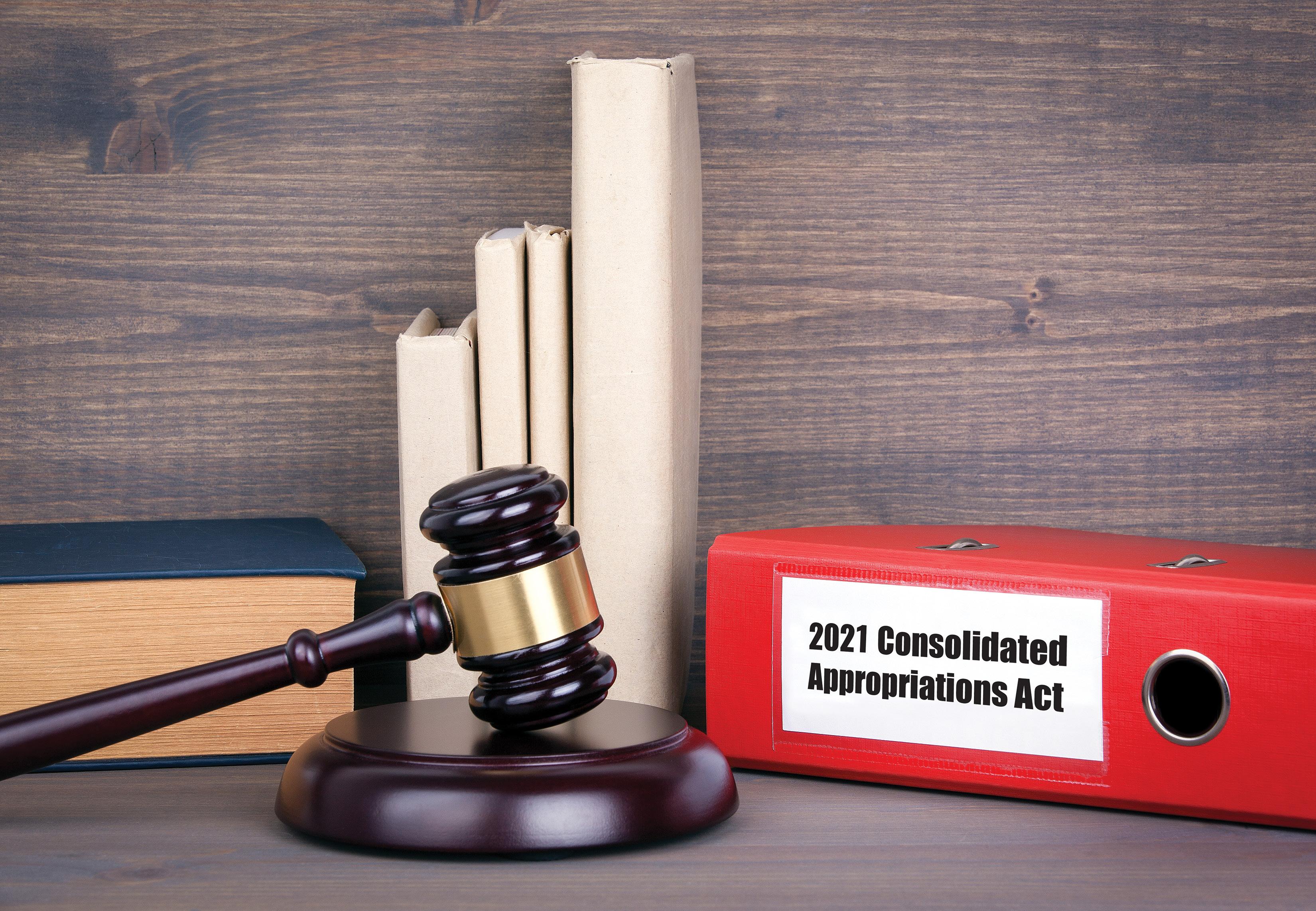
11 minute read
A summary of the Consolidated Appropriations Act (CAA

A Summary of the Consolidated Appropriations Act

Although tax professionals are unfortunately starting to get used to the trend of eleventh-hour tax legislation, Congress really outdid itself this past year, passing the 5,500-page Consolidated Appropriations
By Christopher Act 2021 (the Act) shortly after
E. Rosborough, midnight on Dec. 22, 2020. By
CPA, JD now, most of us are familiar with the advance tax credits for individuals, the expansion of the Payroll Protection Program (PPP) and the provision allowing for full deductibility of expenses paid with forgiven PPP funds, but this article will highlight/summarize some of the other aspects of the Act that many will find beneficial when filing 2020 and 2021 tax returns.
Charitable contributions
• The Act extends through 2021 the $300 charitable contribution deduction for qualified contributions made by nonitemizers. • The Act extends the enhanced deduction limitations in place for 2020 for qualified contributions made in calendar year 2021 by individuals who itemize and corporations. Individuals may deduct up to 100% of their 2021 AGI and corporations up to 25% of their 2021 taxable income.
PPP relief and beyond
• PPP debt forgiveness was not the only provision granted favorable tax status. The SBA 7(a) debt relief program and emergency EIDL grants were also granted tax relief. • The Act also provides $15 billion for grants for shuttered venue operators and exempts the grant from gross income while allowing deductions for expenses paid with the grant. • The Act expanded PPP eligibility to FCC license holders and newspapers with more than one physical location, allowing greater access to PPP for these borrowers. • Small IRC Section 501(c)(6) organizations and destination market organizations that do limited lobbying are now also eligible for PPP loans. • Professional sports leagues and organizations with the purpose of promotion or participating in a political campaign were specifically made ineligible for PPP loans. • ASC 740 impact for fiscal-year companies: o Although an in-depth analysis of this issue is outside the scope of this article, fiscal-year companies with tax years that ended before Dec. 27, 2020, that record tax provisions should record a temporary item for PPP expenses when there is a timing difference in accordance with the tax law in effect at that time. They would then reflect the tax benefit of the deduction of the expenses in the provision for the period that includes Dec. 27, 2020.


• Finally, the Wisconsin Department of Revenue has clarified that because Wisconsin has not adopted the Act, PPP-covered expenses are not currently deductible for Wisconsin taxable income. (It should be noted that at the time of writing, the Wisconsin legislature was considering a bill that would rectify this divergence from federal law, and this bill may have passed by the time of publication.)
Employee retention credit
Outside of the PPP loan changes, the modification and extension of the CARES Act Employee Retention Tax Credit has the potential for the greatest impact. The highlights of these changes are as follows: • Wages through June 30, 2021, are now eligible for the credit. • The credit is now open to any employer, regardless of whether or not a PPP loan was taken. However, the same wages used in the PPP loan application cannot be used again here. (Hopefully, additional guidance on this issue has been provided by the IRS by the time this article is published.) • The Act reduced the 2020 eligibility requirement of a 50% quarter-over-quarter reduction in gross receipts to 20% for 2021. In addition, the new rule allows a company to elect to use the gross receipts from the immediately preceding quarter rather than the current quarter. • The Act raised the 2020 credit limitation of 50% of employee wages to 70% for 2021, meaning that the maximum credit will be $7,000 per employee per quarter. • For taxpayers who failed to take the credit on their 2020 Form 940s, they are now eligible to file amended Form 941-Xs and claim the refundable credit.
• The definition of “small” employer was raised from no more than 100 employees to no more than 500. The advantage of this is that only “small” employers are allowed to use all qualified wages paid to employees rather than just compensation paid to employees for the time they were not working.
IRC Section 163(j) and electing real property trades or businesses
• The Act retroactively amends the TCJA and requires an electing real-property trade or business to use a 30-year
ADS recovery period for residential rental property placed in service before Jan. 1, 2018. • The IRS will need to provide taxpayers with procedures to apply the 30-year ADS recovery period retroactively.
In the past, the IRS has allowed for amended returns, administrative adjustment requests (for partnerships and
LLCs) or changes in accounting method.
Other credits and incentives
The Act extended or modified a number of credits and incentives. A sampling of these include the following: • The applicable period for the FFCRA family and sick leave credit has been extended from Dec. 31, 2020, to
Mar. 31, 2021. • The Act extended the work opportunity tax credit for five more years and is now applicable to wages paid or incurred to a qualified individual who begins work through Dec. 31, 2025. • Although the increased expensing under Section 179 and nonrecognition of gain on rollover of Empowerment
Zone investments were terminated for tax years
beginning after 2020, tax-exempt enterprise zone facility bonds and the empowerment zone employment credit were retained through 2025. • The Section 45S paid family and medical leave credit that was enacted with the TCJA has been extended for five additional years to apply to paid leave wages paid through
Dec. 31, 2025. • The Act made the energy-efficient building deduction under Section 179D permanent and indexed it to inflation for tax years beginning after 2020. • The Act extends the credit allowed under Section 45 for one year for electricity produced from certain renewable resources. • The Section 30C credit for qualifying alternative fuel vehicle refueling property is extended for property placed in service by Dec. 31, 2021. • The energy-efficient home credit under Section 45L has been extended for one year and is applicable to homes acquired through Dec. 31, 2021. • The Section 25D credits for residential energy-efficient property is expanded and extended for property placed in service through Dec. 31, 2023. • The excise tax credits for alternative fuel used or sold for use as fuel in a motor vehicle and for alternative fuel mixtures produced are extended for one year, through
Dec. 31, 2021.

Excise tax breaks for craft brewers, wineries and distillers
Any article discussing the Act for an audience of Wisconsin CPAs would be remiss if it did not highlight the permanent reduction in excise taxes first introduced in the TCJA. In addition, under the UNICAP rules of Section 263A, the Act makes permanent the exclusion of aging periods for beer, wine and distilled spirits from the production period for purposes of interest capitalization rules. Although it is impossible to do complete justice to a 5,500page bill in a 1,200-word article, most taxpayers will find many provisions of the 2020 Consolidated Appropriations Act very beneficial as they try to manage cash flow and navigate their way out of the recession. While the looming national deficit has many concerned about the direction that the next set of tax legislation might take, let’s all hope that these bills start passing earlier in the year to allow more time for feedback from tax professionals and planning once the bills are signed into law.

Christopher E. Rosborough, CPA, JD, is a senior tax director with RSM US LLP in Madison. Contact him at chris.rosborough@rsmus.com. Although it is impossible to do complete justice to a 5,500page bill in a 1,200-word article, most taxpayers will find many provisions of the 2020 Consolidated Appropriations Act very beneficial as they try to manage cash flow and navigate their way out of the recession.
We study changing tax laws so you don’t have to.
RSM and our dedicated team of tax advisors constantly monitor the latest regulations and laws. With extensive middle market experience, we’re able to tailor solutions to your specific challenges. And our global resources help your company advance with confidence.
rsm us.com
Visit rsmus.com/aboutus for more information regarding RSM US LLP and RSM International.
2020 Donors!
Your donation to the WICPA Educational Foundation sends a clear message that you believe in the future of the accounting profession. We appreciate your commitment and THANK YOU FOR YOUR SUPPORT.
Lawrence W. Abler Michelle M. Adams William R. Ahlstrom Michael D. Akers John C. Andres Richard J. Anheier Laura J. Arnow Harold B. Averkamp Brian S. Baumgart Ann Becker Donald J. Becker William C. Beisenstein David A. Benner Kathryn L. Bennett Michael J. Berns Sr. Karla E. Blair Richard L. Blamey Jennifer M. Bogli Richard J. Boulay James D. Brandenburg Erin J. Breber Rochelle L. Brede Steven J. Brettingen Merlin E. Breunig Mike Bruflat Dana E. Brunstrom Gregory G. Butler Suanne M. Cain Raimond Cerbins Jon S. Chamberlain Stephan J. Chevalier Christopher M. Cholka Edward H. Cichurski Michela J. Cobb William B. Coleman Cheryl A. Connor Robert E. Cook Joann Noe Cross Gary L. Dahlen Jeffrey A. Davis Curtis M. Day Gerald E. Denor Suzanne M. Denzine Patti L. Desrosier Jeff Dewane Linda S. Dicks Daniel R. Diedrich Richard A. Dieffenbach Andy Diehl Peter J. Doemel Michael D. Donahue Sean P. Donahue Benjamin E. Douglas James W. Duquaine Kathryn Eaton Dale L. Ebert Kathy-Ann Edwards Kathryn Erickson Gary A. Ertel Deidre A. Erwin Jennifer Fahey Tyler Fallahi Fred G. Farris Michael O. Festge Delores M. Fischer David C. Fohr Robert J. Foulks Jr. Spencer L. Francis Jeffrey A. Frank Scott E. Fredrick Charles F. Freiberg Michael E. Friedman Anthony J. Fuerst Michael D. Gabron Chris J. Gadient Jon C. Gage Jon C. Gaines Randall J. Garrity Jessica B. Gatzke Richard K. Gaumer David M. Geertsen Sharon A. Geertsen W. Richard Gerhard John A. Gerold Charles E. Gierl Charles H. Gietzel Alan J. Giuffre Daniel L. Goelzer Robert C. Goldie Kathryn L. Golsteyn William D. Goodman Patrick G. Gosz Michael H. Grams Kurt E. Gresens William P. Grimmer Randall S. Grobe Douglas W. Haag Michael J. Hablewitz David A. Hagen John A. Haider Ryan J. Hanson Walter T. Harmann Theodore E. Hart Martin G. Hartwig Katherine L. Hauser Daniel J. Heerey William G. Heinrich Glen V. Helmbrecht James R. Herman Joy L. Hertlein Patrick G. Hoffert Kathleen J. Hoffman Allyson J. Hofstede Tammy J. Hofstede Steven A. Hollmann Katy Hook Jessica M. Horning James R. Hornung Wayne N. Huberty Patricia R. Huettl Thomas Iannacone Anthony J. Igl Joseph P. Imhoff George S. Jaloviar Christine Janssen Noah J. Janssen Maria Jarvi Jeffrey A. Jaschinski David M. Johnson Elizabeth R. Johnson Ruth A. Kallio-Mielke David A. Kamke Carl F. Kantner Nathaniel J. Karls Lawrence M. Kean John R. Kellerman Brian M. Kelley Paul F. Kersten James W. Kiefer Stanley C. Kiefer David E. Kimpel Fr. Kurtis J. Klismet Tricia A. Knight William L. Komisar Michael W. Konecny Thomas L. Koops Thomas H. Koplin Rosanna L. Kopling Thomas G. Kortas Jason R. Krentz Glenn R. Krieg Bernard Kristal Ann T. Kropp Keith M. Kwaterski Mary L. La Macchia Richard C. Larson Lawrence Lauwasser Jack G. Lee III Charlotte J. Liddicoat Ronald A. Ligman Richard D. Lindgren Patrick R. Lyons Wai Ping Ma Muriel L. Marx Hoffmann Lucretia S. Mattson Robert T. McGrane Krista M. McMasters William P. Merrick Thomas L. Mickelson Glen A. Milkus Eugene J. Miller Howard C. Miller James P. Miller Randall L. Miller Robert C. Miller William D. Miller Jean M. Mosher James R. Murray Robert J. Nenahlo Chad S. Neumann Terence A. Niewolny Dan J. O’Leary William C. O’Loughlin Wayne E. Olsen Danica E. Olson Gerald A. Ontko Dana S. Outhouse David G. Page Thomas J. Pamperin Wendy A. Peters Sandra M. Peterson Ray Petkovsek John W. Pierquet James L. Possin Wendy K. Potratz Daren J. Powers Gerald E. Powers Steven A. Pullara Keith A. Radke Richard A. Reale II Glenn E. Reinl Ronald E. Roberts Joseph A. Rock Douglas W. Rogers Michael R. Ronk Kenneth P. Rose Henry A. Rueden John G. Sawtell Matthew J. Schaefer Thomas A. Scheidegger David K. Schlichting Eli H. Schmukler Robert A. Schneider Marlene M. Scholz Harold L. Schroeder Vernon R. Schroth Richard B. Schultz Frank R. Scott Richard A. Scott Steven B. Seymour Julie A. Shannon Kimberly M. Shult Dan E. Smith Jane M. Somers Richard W. Spencer Joe A. Sperstad Terry T. Strittmater Mary E. Stroud William S. Tatman Martin C. Thomas Dennis F. Tomorsky David J. Towne Kim L. Tredinnick Debra M. Trost James F. Tullis Marlene Udovich Carol A. Valley Jon G. Van Drisse Lynn T. Visser-Young Robert L. Vrakas John R. Walicki Roberta A. Ward Larry J. Weber Carl F. Wegner Jr. Paula A. Wegner Thomas H. Weingarten Debra R. Welch Joseph P. Wenzler Lori A. Wermuth Norbert F. Whittle Sarah R. Whyte Thomas G. Wieland Susan M. Wilcox Clifford A. Williams Dennis G. Wojahn James W. Woloszyk Michael A. Zongolowicz
Special thanks to donating organizations:
Deloitte & Touche LLP Ernst & Young LLP Grant Thornton LLP KPMG LLP Wipfli Foundation Inc.






